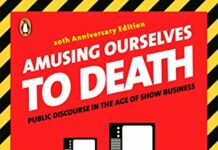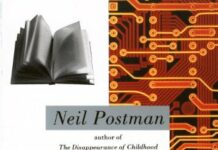
Ebook Info
- Published: 2011
- Number of pages: 225 pages
- Format: PDF
- File Size: 1.14 MB
- Authors: Neil Postman
Description
In this comprehensive response to the education crisis, the author of Teaching as a Subversive Activity returns to the subject that established his reputation as one of our most insightful social critics. Postman presents useful models with which schools can restore a sense of purpose, tolerance, and a respect for learning.
User’s Reviews
Reviews from Amazon users which were colected at the time this book was published on the website:
⭐Finally! A book asking “What is education for?” not just “How can we do education better?” Postman gives a balanced treatment full of great insights. Just take a look at the beginning: Pg. ix – “I began my career as an elementary school teacher and have not for a single moment abandoned the idea that many of our most vexing and painful social problems could be ameliorated if we knew how to school our young. You may conclude from this that I am a romantic, but not, I think, a fool. I know that education is not the same thing as schooling, and that, in fact, not much of education takes place in school… To the young, schooling seems relentless, but we know it is not. What is relentless is our education, which, for good or ill, gives us no rest. That is why poverty is a great educator. Having no boundaries and refusing to be ignored, it mostly teaches hopelessness. But not always. Politics is also a great educator. Mostly, it teaches, I am afraid, cynicism. But not always. Television is a great educator as well. Mostly it teaches consumerism. But not always.”There’s a big misconception today about what schools are. Most people believe that school = education, and that good grades/academic success = being well educated. But high schools today don’t focus education; rather they mostly focus on allocating economic opportunities to those who are capable and eager to obey. And this is an important and remarkable function of schools; otherwise economic opportunities would be determined by inheritance and family connections, as in past generations. But I agree with Postman that this aspect of schooling has become dangerously overemphasized in our society; to the point where learning about society, the original “end” of education, has become nearly driven out of our classrooms. That’s the danger of the whole No Child Left Behind and emphasis on standardized test scores. Education has to do with understanding how society works. This can hardly be said of too many schools today.
⭐Postman chose this title to purposely have a double meaning: that we’ll have an end to successful public education if it doesn’t have a meaningful end, or purpose, to it. In the first part of the book, he suggests some purposes that don’t work: consumership, economic utility, technology, multiculturalism. He then suggests some overriding narratives that could work:• “The spaceship earth”—viewing the earth as a planet we all share and thus need to take care of, beginning in our own communities.• “The fallen angel”—an admittedly religious metaphor that recognizes that fallibility of humankind and our thinking; Postman notes that scientists, most of all, understand this: today’s science is just today’s understanding and can change tomorrow.• “The American experiment”—”Can a nation be formed, maintained, and preserved on the principle of continuous argumentation?”• “The law of diversity”—to recognize the “significant artistic, intellectual, and social contributions from diverse ethnic groups,” not to raise one group above another but to enrich us all by gathering the best of ideas from all cultures.•”The world weavers/the world makers”—”how we use language, how language uses us, and what measures are available to clarify our knowledge of the world we make.”
⭐As with many aspects of our national life education must face advances in technology almost whether one desires to or not. Postman follows this path in both End of Education and Technopoly. In other words the two books are, to this extent, companions in Postman’s continuing crusade as critic of our national way of life, especially as these two topics are concerned. He makes a powerful case for the relentless intrusion of technology on all segments of our lives while the improvements in education is being ignored. He says, “Technological change is not additive; it is ecological. A new technology does not merrely add something; it changes everything” a statement neatly tying his two books together. If there is a thesis to Postman’s take on life concerning technology and education it is this. In reading either book it soon becomes obvious how both of these paramount issues for the US let alone the world, demand attention from the individual family to the nation. The sad reality is that Postman, while innately optimistic, is less than sanguine if something is not done soon to tame one and improve the other.
⭐This book is unmistakably a work by Neil Postman! He gives a very interesting view on how our culture and education are structured with the basis in what he calls a “narrative” stemming from the need to believe in some gods, so you can see a lot of allusions to the idea of the mono myth here. Postman also gives clear suggestions for how the system of education and the approach to teaching can be modified in order to turn around the imminent end of education and make it into a positive constructive force for the future. There are a lot of crossovers with “Teaching as a Subversive Activity” which Postman co-authored.
⭐For me it was just too dry and rambly. I am not a deep philosophical this ker though so it is not my cup of tea. Those more educated and those who love to read might enjoy it.
⭐In the manner for which Neil Postman is so well known and loved, this book outlines the impact of social / media practices on our understandings of School and Education.This is an important read for anyone involved in education — K-12 or higher ed — in the 21st century, and particularly for those of us struggling to advance the warrant for the importance of humanities education.
⭐I don’t necessarily agree with everything Postman says but he does have a way of bringing out the important issues. Before we can reform education, we must have a firm idea of what it is we want education to accomplish. Postman points out many reasons (narratives) for education (schooling) some obvious, some not so obvious. This book is well written by a knowledgeable figure in education. I recommend this book for anyone who thinks schooling our young is important, no matter what the reason.
⭐As parents consider how to go about schooling of their children, they are confronted with two problems. Firstly, we have the engineering problem which deals with the means by which the young will learn. Postman believes that the debate over the future of America’s schools (the same could be applied to schools in the UK) focuses too much on engineering concerns — curricula, teaching methods, tests, the role of technology, etc. — while very little attention is paid to the second problem; the metaphysics of schooling. What is more important is that you become a different person because of what you have learnt; that your world is altered. For that to happen, you need a reason. Nietzsche’s aphorism helps us here: “He who has a why to live can bear with almost any how.” Postman talks about having a god to serve; using the word as a synonym for a narrative. The point is “without a narrative, life has no meaning. Without meaning, learning has no purpose. Without a purpose, schools are houses of detention, not attention” (pg. 7).Using the theme of god, Postman describes new gods that have rushed in to replace the old, but most have had no staying power (such as the gods of communism, Nazism, and fascism). The same applies to modern education; our students are presently being asked to serve several gods. What keeps our schools from being effective, he says, is the lack of commonly accepted stories, or the inadequacy of those we have in giving meaning and direction to schooling. At the moment, education is geared towards economic utility, consumerism, technology, multiculturalism and other bogus objectives. These new gods are failing us and are incapable of providing a rich and sustaining rationale for public education.So which gods may serve us? Postman offers an answer in the form of five narratives: “Spaceship Earth” (the notion of humans as stewards of the planet – an echo of ‘khalifa’ mentioned in the Qur’an); “The Fallen Angel” (a view of history and the advancement of knowledge as a series of errors and corrections); “The American Experiment” (the story of America as a great experiment and as a centre of continuous argument); “The Laws of Diversity” (the view that difference contributes to increased vitality and excellence, and, ultimately, to a sense of unity); and “The Word Weavers/The World Makers” (the understanding that the world is created through language — through definitions, questions, and metaphors).Postman also offers a number of admittedly radical innovations toward making schools more effective. He argues that textbooks should be altogether eliminated because they have a deadening effect on students and promote a view of education as the acquisition of immutable facts. He proposes that teachers offer incentives to students who find errors in their teachers’ lessons. And he feels that the subjects of archeology, geology and astronomy be given the highest priority since they imbue students with a sense of awe and global interdependence.These proposals notwithstanding, Postman stresses that his main purpose is to promote a serious conversation about the underlying reasons for education — not about policies, management, assessment, and other engineering matters. While these are important, he states, “they ought rightfully to be addressed after decisions are made about what schools are for.”If a metaphor may be permitted, we can make the trains run on time, but if they do not go where we want them to go, why bother?
⭐Neil Postman was really smart guy with high ability to transfer his knowledge.
⭐Thanks
⭐More insight from the Brilliant Postman!
⭐Helps make sense of the world and why newer generations just don’t “get it” when you are explaining things to them. They don’t think the way older generations do and this book explains why. “The media is the message”
Keywords
Free Download The End of Education: Redefining the Value of School in PDF format
The End of Education: Redefining the Value of School PDF Free Download
Download The End of Education: Redefining the Value of School 2011 PDF Free
The End of Education: Redefining the Value of School 2011 PDF Free Download
Download The End of Education: Redefining the Value of School PDF
Free Download Ebook The End of Education: Redefining the Value of School



